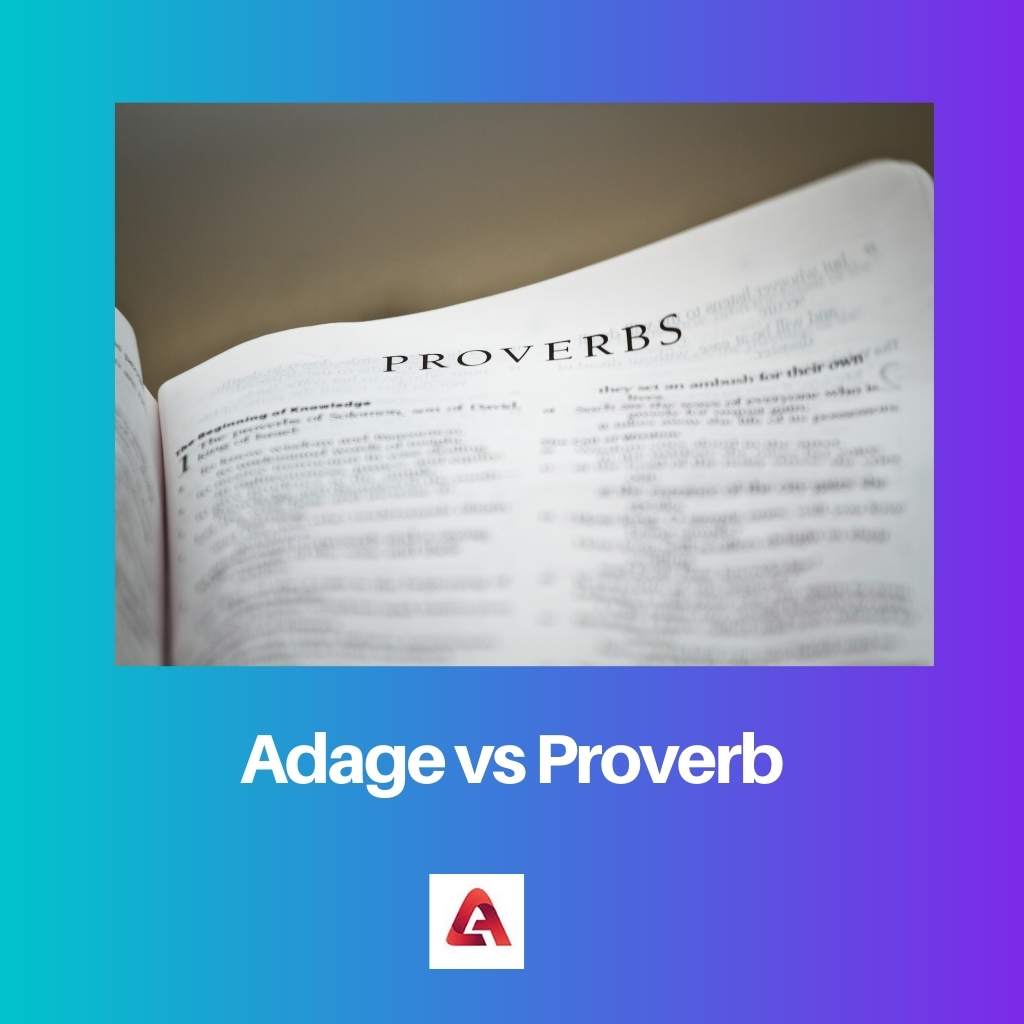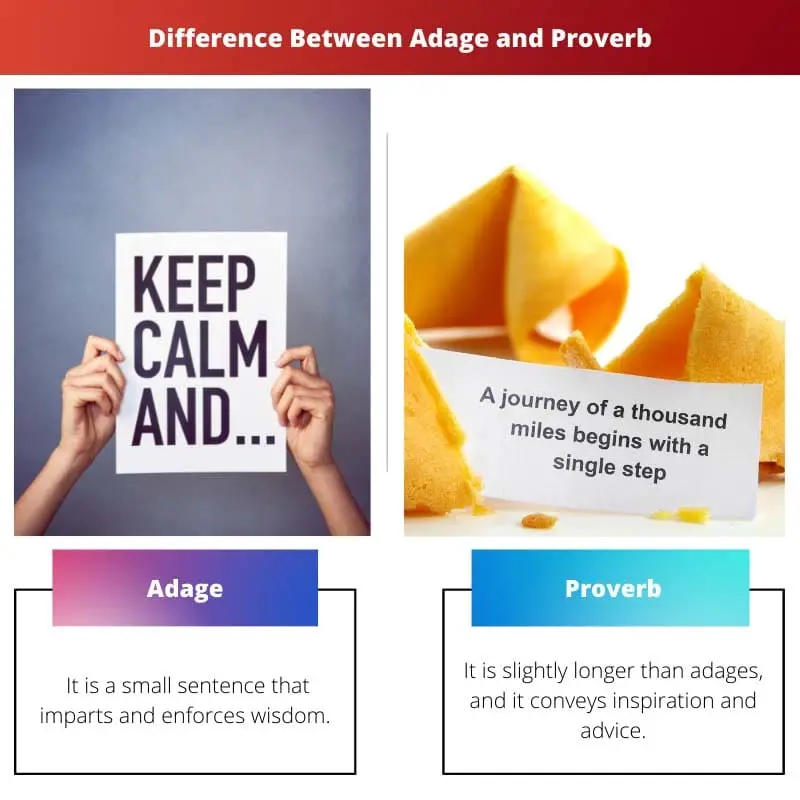English is a versatile language with more than a dozen terms like idioms, phrases, adages, proverbs, and much more. Generally, these are ‘ a set of words together used to convey wisdom, advise, inspiration and messages from our ancestors.’
When used in speech and writing, they enhance our language skills and make us look educated and of high quality, and is also the message we want to convey also strongly impacts the listeners.
Key Takeaways
- An adage is a short, traditional saying that conveys advice or a moral, while a proverb is a well-known, short phrase that expresses a general truth or a piece of wisdom.
- Adages are culturally specific, while proverbs are universal.
- Adages come as a metaphor, while proverbs are more direct.
Adage vs Proverb
Adages are sayings that have been in use for a long time and have become widely accepted as true, are short and to the point and contain a moral lesson. Proverbs are widely known and used sayings, but they may not necessarily be as old or as widely accepted as adages.

An adage is similar to a proverb, but at the same time, it is also different in several ways. It is widely accepted by many people around the world, globally, and it is considered a general truth.
Unlike proverbs, it is so old, very ancient and oriented much with philosophy. They majorly convey experiences of life and lessons that we all can relate to.
A proverb is a set of words that convey advice and message that are almost universally relatable. These are passed on from generation to generation and are conventional.
They express truth, advice, inspirational messages, and life lessons. They do not convey direct meanings, and they are metaphorical as well as completely formal. They fall under the genre ‘ folklore.’
Comparison Table
| Parameters of Comparison | Adage | Proverb |
|---|---|---|
| Definition | It is a small sentence that imparts and enforces wisdom. | It is slightly longer than adages, and it conveys inspiration and advice. |
| Length | It is short, precise, and concise. | It is longer and consists of more than a sentence. |
| Usage | They are used by a large audience since it is universally accepted. | A lesser audience uses them, and they vary slightly in every region. |
| Origin | Adages are philosophical and they were brought up by being passed over from one generation to the other. | Proverbs originated from various sources like the Bible, holy scriptures, dramas, stories, literature, songs, movies, and from the words of great thinkers. |
| Role of The Bible | The Bible doesn’t play a major role. | Most of the proverbs were brought up from the bible. |
What is Adage?
An adage is shorter in length, and it is a memorable saying. It is universally agreed, accepted, and preached.
This is more commonly used more widely than that proverbs since it is relatable to a lot of people and talk about the common life lessons that can be applicable to anyone and everyone belonging to different races and origin.
The wisdom, advice, and lessons conveyed through the adages are quite conventional and traditional.
It is timeless, and this is its unique quality. It also alarms people on what the future might hold and how they should take precautions to guard themselves against impending dangers and also lifts the confidence and hope in the minds of the people.
The message they convey is strong, powerful, and has more impact. It comes in handy when someone wants to enforce a message strongly. It is also best suited for a larger and unanimous audience, as it is timeless and not based much on religion.
They are repeated a lot and used more frequently. They are more commonly used and are popular among people because of their popularity. They are admired by society and have also gained a consensus. Including adages in your speech and writings is such an intelligent move.

What is Proverb?
Proverbs are available in many languages, and proverbs are translated into different languages to ensure that valuable advice or life lesson reaches all people in different regions and races.
Bible has played a major role in preaching and reaching out to a lot of people with these valuable short sentences.
Every culture, irrespective of race and region, has its own proverbs. Though Bible is a major source of proverbs, there are yet a plethora of sources for proverbs. A lot of enlightened and celebrated visionaries and leaders have provided us with proverbs.
Poetry and literature are other major sources.
In addition, songs, movies, dramas, and many more have led to the birth of proverbs. Stories, their morals, and famous dialogues from skits, dramas, and literature have also conquered people’s hearts, and many from these origins are regarded as proverbs.
The oldest proverb, or the very first proverb, goes back to around 1800 BC. Proverbs are extremely helpful in creating a long-lasting and strong impact in the minds of people during a crisis or emergency. However, it may take some time to understand what is realised for younger students.

Main Differences Between Adage and Proverb
- An adage is more ancient than the proverbs and has a longer story, whereas proverbs are more recent.
- An adage is shorter, whereas the proverbs are lengthier.
- Adages are used by a larger audience, whereas a smaller audience use proverbs.
- Adages are used more frequently, whereas proverbs are relatively less frequently used.
- Not a lot of adages are derived from the bible, but a lot of proverbs are taken from the Bible.

- https://cdn.journals.lww.com/plasreconsurg/Fulltext/2006/07000/_See_One,_Do_One,_Teach_One___An_Old_Adage_with_a.45.aspx
- https://www.jstor.org/stable/973030

The distinction between adages and proverbs is crystal clear in this article. The historical and cultural context is fascinating.
Absolutely. The article’s emphasis on the role of the Bible in proverbs is thought-provoking. It’s an excellent read.
I found the article to be enlightening and thought-provoking. It’s a fascinating exploration of the linguistic nuances found within adages and proverbs.
Absolutely. The timeless nature of adages and the universally relatable advice in proverbs are well-articulated in the article.
I found this article to be informative and well-researched. The comparison between adages and proverbs is thorough and intriguing.
I couldn’t agree more. The article presents an in-depth analysis of these linguistic elements in different cultures.
This article offers a compelling exploration of the rich cultural and philosophical underpinnings of adages and proverbs. It’s a remarkable piece of writing.
Without a doubt. The profound insights and meticulous comparisons in the article elevate our understanding of these linguistic elements.
I echo the sentiment. The article’s treatment of adages and proverbs is both enlightening and intellectually stimulating.
The author’s lucid explanation of adages and proverbs is noteworthy. The article is a valuable resource for language enthusiasts and scholars alike.
Absolutely. The comprehensive analysis provided in this article exemplifies the depth of linguistic wisdom found in adages and proverbs.
This article provides a compelling discussion on adages and proverbs. The historical significance and universal appeal are well-explained.
I’m impressed by the level of detail in this piece. The examples used to illustrate the differences between adages and proverbs are impactful.
I appreciate how the article delves into the distinctive origins and influences that shape adages and proverbs. A remarkable analysis.
Great article! It’s always interesting to learn about the different nuances of language. I appreciate the detailed comparison between adages and proverbs. Good job!
I completely agree. The insights provided in this article are quite enlightening. I particularly enjoyed the comparison table. Very well-written.
This article has provided a clear understanding of adages and proverbs. Thanks for sharing.
The author’s elucidation of adages and proverbs is commendable. I particularly enjoyed the section on the role of the Bible in the development of proverbs.
I share the same sentiment. This article sheds light on the rich cultural and historical aspects of adages and proverbs.
The article’s meticulous comparison between adages and proverbs is thought-provoking. An excellent exploration of language and culture.
The article’s erudite examination of adages and proverbs is exemplary. It provides a thorough and engaging analysis of these linguistic phenomena.
Absolutely. The depth and breadth of the article’s coverage of adages and proverbs are truly impressive.
I wholeheartedly concur. This article is a testament to the enduring significance of adages and proverbs in language and culture.
The article presents a comprehensive and insightful analysis of adages and proverbs. It’s a testament to the richness of language and tradition.
I couldn’t agree more. The article showcases the enduring wisdom encapsulated in adages and proverbs across different cultures.